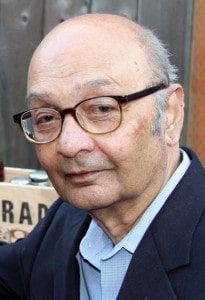Renowned Mathematician Prof. Emeritus Raghavan Narasimhan no more
ILLINOIS
A Madras-born mathematician, Prof. Emeritus Raghavan Narasimhan died after a brief illness at Bernard Mitchell Hospital in Chicago Oct 3. He was 78. Dr. Narasimhan had spent more than four decades on the University of Chicago mathematics faculty, and described by some of his colleagues as an ‘analyst’s analyst’, Shmuel Weinberger, the Andrew MacLeish Professor and chair of Mathematics, paid rich compliments to him, describing him as an analyst’s analyst. “He was a top analyst whose work had technical virtuosity, breadth of vision and elegance that, in difficult technical fields like analysis, are hard for non-analysts to appreciate,” he said.
Prof. Madhav Nori also praised Narasimhan for his analytical prowess. “Narasimhan had a truly astounding insight in analysis,” Nori said. “He often got to the heart of any problem in this field with such speed that it dazzled onlookers. He maintained a deep interest in many areas in mathematics and was very generous with his ideas,” he said in a statement.
Narasimhan was a beloved and highly respected member of the Department of Mathematics for more than four decades, noted Weinberger.
“We appreciated his unique view of the world and his exquisite and uncompromising taste in mathematics. Much of his work was in several complex variables, but he had a deep interest in analytic number theory as well.”
Narasimhan was probably best known for work in 1960 that presented his solution to the Levi problem for complex spaces. He was invited to speak about this work in 1962 at the International Congress of Mathematicians. Giving an invited address at the congress is a coveted professional distinction among mathematicians—it was all the more remarkable, considering it occurred a year before Narasimhan completed his doctorate.
One of Narasimhan’s close collaborators was Princeton University’s Charles Fefferman, who won the Fields Medal, the highest honor in the field.
In the 1990s, Narasimhan and Fefferman wrote a series of joint papers on the borderline of analysis and real algebraic geometry. Their results answered questions arising from the work of Alberto Parmeggiani of the University of Bologna in Italy.
“The phenomena are subtle and surprising, and the proof is formidable and related to a remarkable collection of geometric and analytic ideas,” Weinberger said.
Narasimhan’s body of work included scores of research papers and six books. His most recent book was the second edition of Complex Analysis in One Variable, in collaboration with Yves Nievergelt, published in 2001. He also authored Introduction to the Theory of Analytic Spaces (1965), Analysis on Real and Complex Manifolds (1968, revised in 1985), Several Complex Variables (1970) and Compact Riemann Surfaces (1992). He also was editor of Riemann’s Collected Works (1990).
The University of Geneva awarded Narasimhan an honorary doctorate in 1986. The citation lauded him for his profound influence in the development of mathematics in French Switzerland, and for the training he provided to many doctoral students.
Narasimhan was born Aug. 31, 1937, in Madras. He received his bachelor’s degree from Loyola College in Madras in 1957, and his Ph.D from Bombay University in India, in 1963.
Narasimhan is survived by his wife, Lynn, and 10 nieces and nephews. A memorial service will take place Dec. 5 at the Quad Club, 1155 E. 57th St., Chicago.













